'Chaos and disorder' in the pandemic: Miami declares a state of emergency and closes trade against crowded beaches and agglomerations
South Florida is full of tourists who have gone on spring break
The city of Miami Beach, in the United States, declared a state of emergency in view of the possibility of worsening the coronavirus pandemic. Measure comes in response to the large crowds that are formed in the so-called "spring break", a traditional holiday that marks the beginning of spring.
The curfew was enacted from 8 pm to 6 am until at least April 12.
Traffic restrictions were also triggered during the curfew and commerce in the busy South Beach area will have to close.
Miami Beach Mayor Dan Gelber said thousands of tourists have brought "chaos and disorder" to the city.
The spring break, or spring break, is a week-long break period for schools and universities in the United States that usually occurs in March or April. It attracts thousands of students to Florida and other hot climate destinations across the country.
Health experts drew attention to beaches and bars full of young people celebrating without a mask and without social distance, as if there were no pandemic.
They fear that in a few weeks there will be a new spike in infections, which have decreased in Florida, and warn of the risk of the appearance and spread of new variants of the virus that can be highly transmissible.
'Responsible vacation' is Miami Beach's slogan for the 'spring break'
"We are very concerned," José Gonzales, an infectious disease specialist at the University of Miami, tells BBC News Mundo, the BBC's Spanish-language service.
"We must insist on the need to respect precautionary measures, such as wearing a mask and maintaining distance."
In addition to the concern with covid-19, the alert for acts of violence that have already caused more than 100 arrests and seizures of firearms in recent days. The episodes led to an increase in the number of police officers on the streets, especially in the tourist district of South Beach.
The local government increased policing in Miami Beach in the weeks of the spring break
For the residents of Miami Beach, the history of chaos and lack of control today is nothing new and the scenes recorded in recent days are repeated every year.
For visitors, especially those who live in cold places, South Florida remains an ideal and easily accessible destination thanks to low-cost airfare.
"We came here just to have fun, we don't want any problems," says Shafal, a young New Yorker from the Bronx who has just arrived in the city.
Health experts are concerned about the lack of precautionary measures by tourists visiting Miami Beach
And for the local government, which recognizes that the city's economy is strongly linked to tourism and hospitality, the situation presents itself as a puzzle in which it is necessary to meet everyone's needs.
As before the pandemic
Springbreakers arrive in Florida from late February to mid-April.
There are several weeks when visitors come and go.
But now is when the flow of tourists is most visible, not just on the beaches, but on the streets and restaurants of South Beach and other areas to the north.
Concern about covid-19 adds to warnings of acts of violence - more than 100 have been arrested
Last Saturday, for example, traffic jams in the North Beach area, queues at supermarkets and the number of people on balconies and inside establishments were practically the same as the scenario before the coronavirus arrived.
The owners of the Juice & Coffee Bar in North Beach celebrate the flow of tourists.
As in parts of Brazil, many tourists do not wear a mask in Miami
"We understand the authorities' concern," they say, "but in the hospitality industry we had a very bad year and now we are starting to see a light."
"We require our customers to wear a mask and we follow all health recommendations. But savings are also very important."
Governor's bet
The economy was precisely the big bet of Florida's governor, Republican Ron DeSantis, who on September 25 reopened the state and lifted health restrictions.
DeSantis has banned city and county governments from imposing fines on those who do not wear a mask or respect social distance, something Miami Beach had been doing.
Florida Governor Ron DeSantis believes his strategy against covid-19 is being successful
Months after the controversial decision, the governor uses economic data from the state to defend that he did the right thing:
Unemployment is below 5% (in April 2020 it rose to more than 13%), restaurants and bars operate almost at the same level as before the coronavirus, and hotel occupancy is 20% lower than normal, a percentage that indicates the recovery of one of the sectors most affected by the closures in the first months of the pandemic.
All this, DeSantis is proud, while the rate of infections and deaths from covid-19 remains lower than that of other states that have applied restrictive measures.
Despite the improvement in some economic indicators, food banks continue to distribute food every week to thousands of Florida residents and several companies have had to close due to the economic crisis
For Gonzales, self-confidence is one of the main risks.
"We know the numbers are falling in Florida," he admits, "but the presence of all these people without a mask and without keeping their distance is a way of getting into trouble."
"Having all these people together increases the chance that the virus will spread again and increase the number of cases."
Like other cities in the country, Miami accelerated the vaccination process against covid-19
It is too early to verify this increase, something that we will only know in the coming weeks.
And the expert points out that the danger is not only in Florida: all these visitors will return to their usual places of residence, where they can infect family and friends.
Right to fun
The young people who now crowd the streets of Miami Beach, many of them newcomers and attentive to their cell phones to know where they should go, do not want to be singled out as responsible for a possible new wave of covid-19.
Miami Beach is one of the most popular destinations during the 'spring break'
"It's my vacation and I'm here to get drunk and have fun," says Shafal excitedly, while waiting on a bench with a friend for the time to enter the apartment they rented.
"I'm not at all concerned about the coronavirus. I'm going to be here for four days," he exclaims, dancing.
Shafal, a young New Yorker from the Bronx, arrived in South Beach on March 16 for a few days of fun
A few meters away, Lisa and Kate, two young girls from Minnesota, enthusiastically watch a game of volleyball on the beach.
They clarify, almost offended, that they are not here "for spring break", perhaps aware of the media's attention in relation to this phenomenon
But the fact is that they are in Miami Beach, on vacation, for a week, and they are also not worried about the pandemic.
The atmosphere in Miami Beach during the spring break is similar to before the pandemic
In the middle of the morning, it is still not possible to see the images that have been circulating on the social networks of crowds in bars or on the streets preventing the circulation of traffic and jumping in police cars.
Curfew
Bars are particularly dangerous places, experts warn. In addition to being generally overcrowded, they are often noisy, causing people to scream, which increases the spread of the virus.
In Miami Beach, the midnight curfew and restrictions on the sale of alcoholic beverages remain in effect
"Don't be silly. Don't come here if you think anything goes here. We'll arrest you and it will ruin your stay here," said the mayor of Miami Beach.
For some residents, the situation is getting to the point that it requires radical measures right away, even if it hurts tourism.
"We are going to spread the word that everything closes," says Phil, a South Beach resident who, for the first time in 14 years, is planning to leave Miami.
Tourism is by far Florida's main industry - in 2018, it generated more than $ 91 billion for the state
"The national narrative is that Florida is open and can do anything. Some are surprised to learn that there is a curfew. They cannot party until 4 am like before. Will it affect our tourism economy for a few years? So be it . Will it affect our reputation? So be it ", defends indignantly.
For Colleen, another resident of the area, it must be assumed that visitors will arrive "anyway".
"Most of them come just to have fun, there are few troublemakers. But we put them on the street, in part it is our fault," he says, referring to the closure of the establishments.
For experts and authorities, the flow of visitors at this time of year is practically inevitable
Faced with the argument that the arrival of tourists is inevitable, the University of Miami infectologist reiterates the importance of not relaxing the protection measures, even if they are not required by law.
"I know that there are no restrictions in restaurants and other places, but we have to be aware, wear a mask, keep a distance of two or three meters and avoid crowds", he concludes.
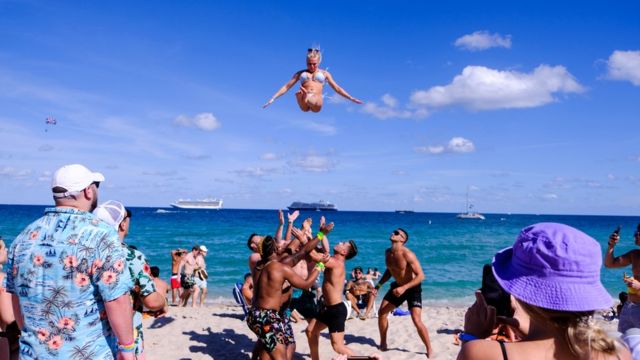
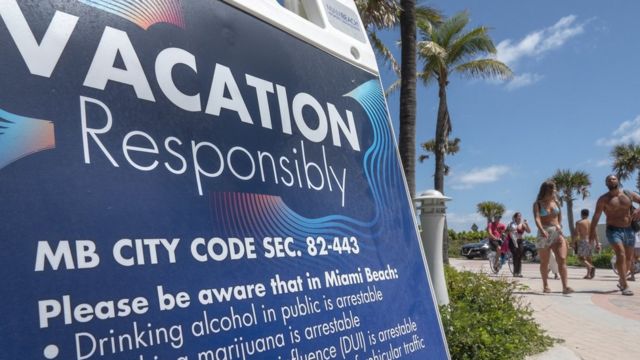
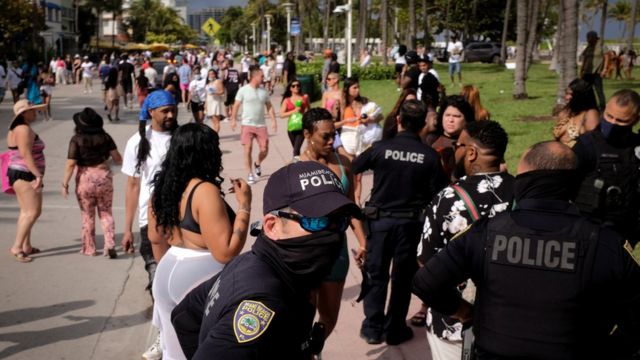
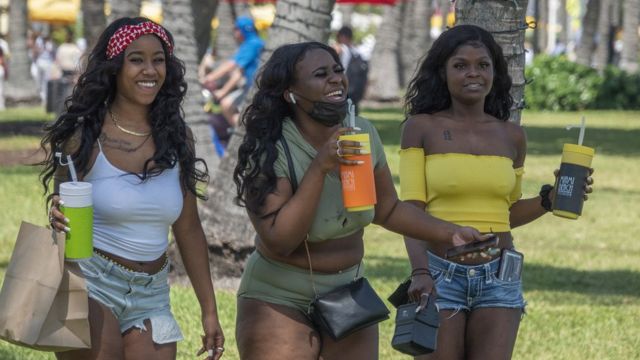
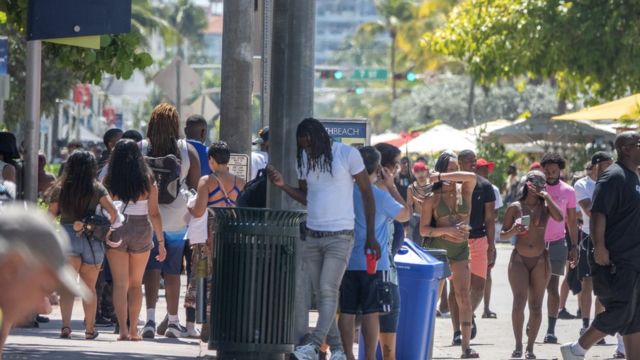
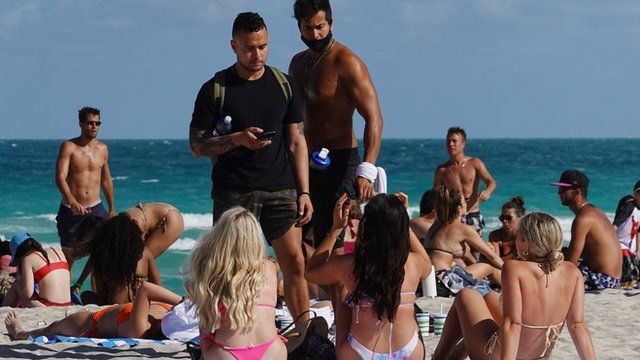
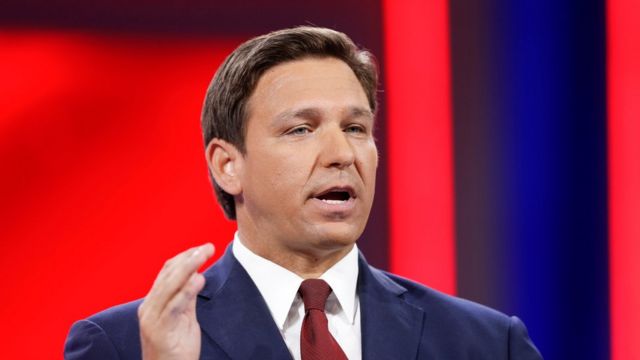
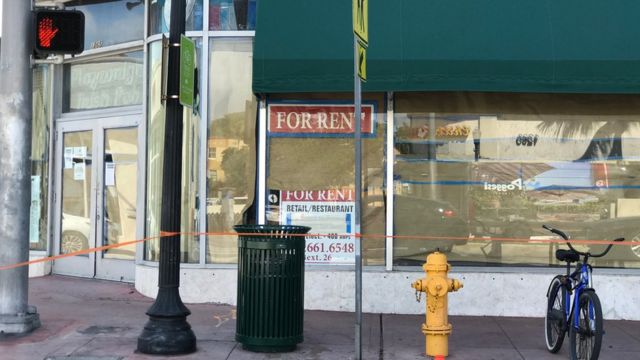
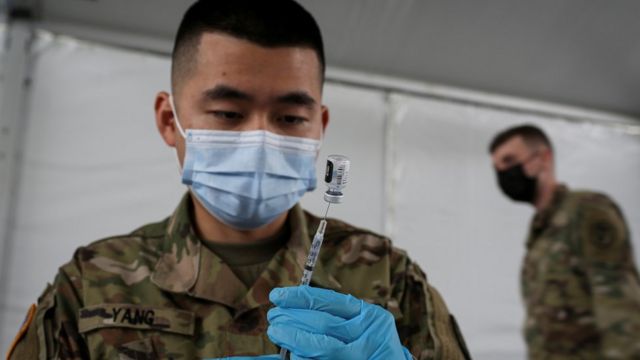
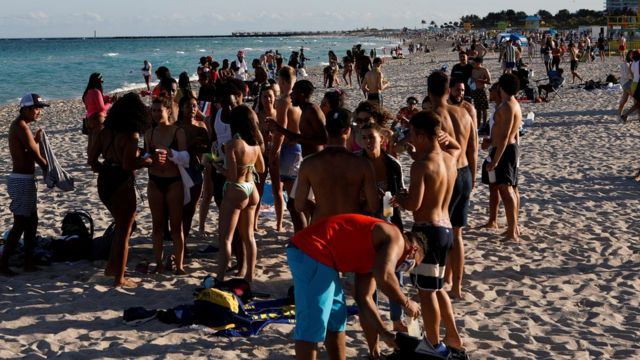
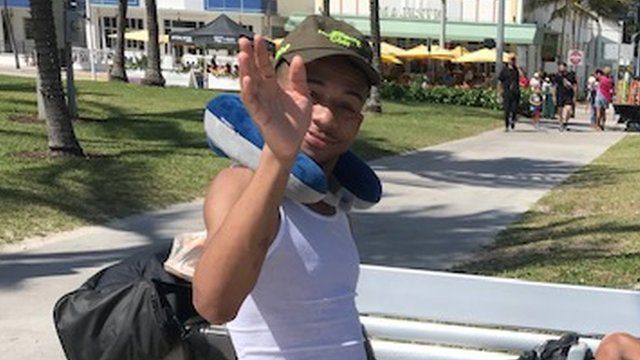
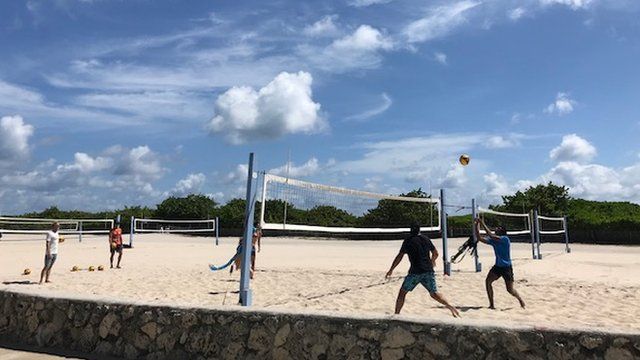
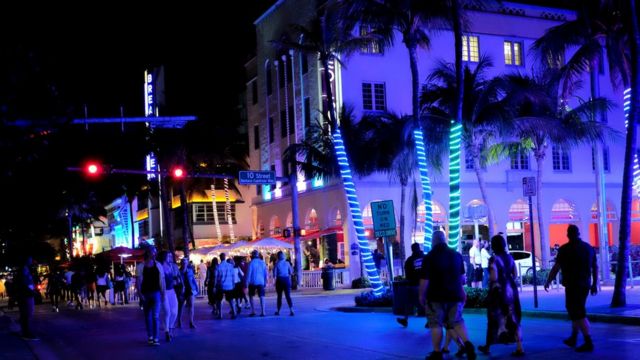
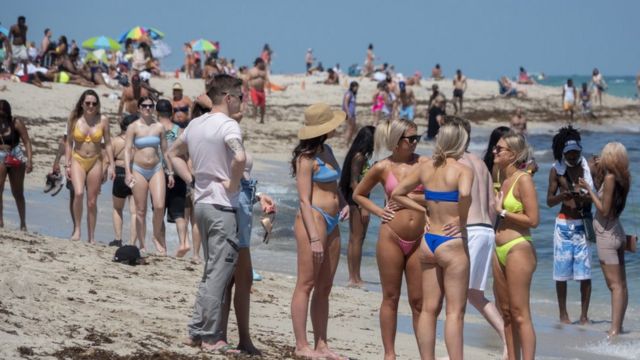
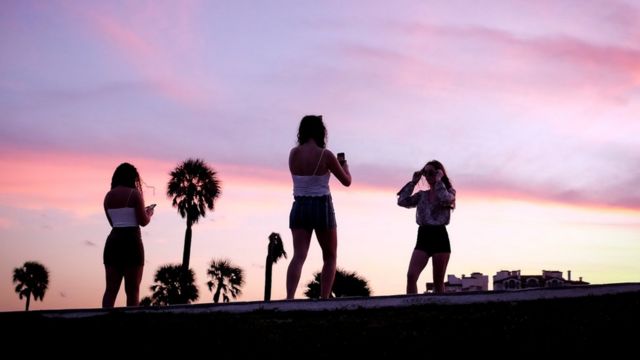

No comments:
Post a Comment